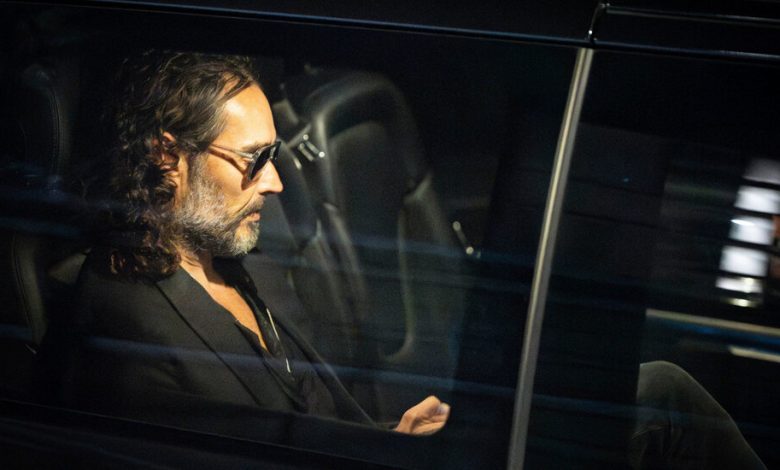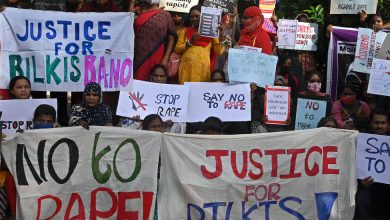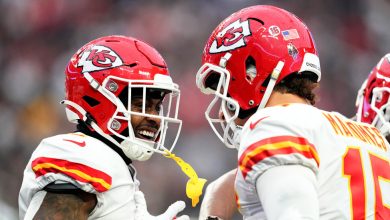Russell Brand’s Alternate Reality

On Sept. 12, four days before he was expected at the Troubadour Wembley Park Theater for another sold-out show, Russell Brand asked his fans for a favor. “I’ve always struggled with authority and being told what to do,” he wrote to ticketholders, attaching a questionnaire for a planned bit with his audience. “Even when it comes to something small like being offered a seat by a doctor, I’ll purposefully refuse rather than comply. Tell me about your relationship with authority — whether you tend to yield to authority or fight it.”
Listen to This Article
Open this article in the New York Times Audio app on iOS.
At the time, Brand’s more-than-two-decade quest for lasting attention had been proceeding apace along two tracks. In mainstream entertainment circles, at home and abroad, he remained the fading but still bankable British comedian whose selectively confessional accounts of heroin addiction and promiscuity made him an avatar of a very mid-aughts sort of fame — the guy who played a rocker version of himself in the 2008 film “Forgetting Sarah Marshall” and would later marry Katy Perry (it was brief). But for those partial to Brand’s midlife canon, he had come to resemble something more like a political sage.
With Jesus-length hair, multidenominational tattoos and promises of unspecified revolution, Brand, 48, had in recent years been reaching millions daily across a media and wellness empire, fusing the downward-facing dogmatism of a proper guru with the cold efficiency of the YouTube algorithm. His remit was nothing less than “a social-political-spiritual movement,” he told listeners. His prime offering was a trove of foreboding and regularly misleading videos from his flagship series, “Stay Free with Russell Brand,” lobbed at a cumulative social media following of more than 20 million. His episode titles charted the ideological swerve of a man who once used his celebrity to elevate progressive causes: “STATE OF FEAR! COVID Propaganda EXPOSED!” “Leaked Audio PROVES Trump Right!”
For the past year, Brand’s recording studio in the Oxfordshire countryside has been blessed as an emerging nerve center of the American right, or at least the anti-anti-right, with a procession of presidential candidates beaming in. In July alone, Brand interviewed Ron DeSantis, who compared Brand favorably to loathsome “corporate journalists”; hyped a pull-up contest with Robert F. Kennedy Jr., conservative media’s favorite lapsed Democrat and Covid conspiracy theorist; and scored the first sit-down with Tucker Carlson after the host’s dismissal from Fox News. “Maybe I’ve just been called a right-wing crazy for so long that I thought I was,” Carlson told me recently. “But if I agree with pretty much everything Russell Brand says, I don’t know what I am.”

In July, Brand scored the first sit-down with Tucker Carlson after the host’s dismissal from Fox News.Credit…Screenshot from Rumble
Like Joe Rogan, the carnivorous pooh-bah of this intellectual space, Brand appeared interested in teaching a certain kind of man how to be a certain kind of man, mining the tension between think-for-yourself riffs and listen-to-me conclusions. (Brand has been a repeat guest on Rogan’s podcast.) Unlike Rogan, he appeared to model a more expansive vision of manhood — vegan, sober, Aldous Huxley-quoting. The event in Wembley, part of a tour scheduled for late summer and early fall, seemed designed to accentuate Brand’s overlapping profiles: electric live performer and terminally online click-hunter. As with much of his output lately, the marketplace would help dictate his direction. The tour was called “Bipolarisation” for two reasons, he joked: because people would be polled and “because I’m severely mentally ill.” His September email to attendees requested answers to several related prompts. “What’s the strangest way you’ve yielded to or gone against authority?” the first question read. “What’s the weirdest/naughtiest/most embarrassing thing you’ve done in reaction to being told what to do?” another asked.
Three days later, Brand’s followers received a less whimsical communication. In a prebuttal video posted across his social media, Brand said he was about to face “very serious allegations that I absolutely refute,” without detailing them. He insisted that all past relationships were consensual. He darkly suggested that “another agenda” might be at play, noting that supporters had long warned him about “getting too close to the truth.” The next day, Sept. 16, The Sunday Times, The Times of London and Channel 4 Dispatches published a yearslong joint investigation in which four women accused Brand of sexual assault between 2006 and 2013. The accounts were specific, revolting and, in some cases, bolstered by medical records and other contemporaneous evidence. The accusers included a woman who was 16, the British age of consent, during her relationship with Brand, who was in his early 30s. She said Brand once forced her to perform oral sex as she strained to push him off, stopping only after she punched him in the stomach.
There was a time, as recently as a few years ago, when this sort of reputational earthquake almost certainly would have followed the dutiful rhythms of celebrity crisis management: performative introspection, nominal contrition (often paired with a narrow denial of the most grievous offenses), a pledge to disappear for a while. Instead, Brand’s story quickly became a self-evident data point in two divergent realities.
In the first, the one still tethered at least somewhat to traditional notions of scandal and consequence, Brand was an overnight pariah and criminal suspect. The police in London opened investigations. More women came forward, including an extra on Brand’s 2011 film “Arthur,” who filed a civil suit in New York claiming that Brand assaulted her in a bathroom on set. Brand’s management company almost immediately dropped him. YouTube suspended him from making money from his channel, which has more than six million subscribers. A parliamentary committee chairwoman wrote to Rumble, the video platform that caters to the right and exclusively carries Brand’s full episodes (shorter clips still appear on YouTube), expressing concern that he might continue to profit there and “undermine the welfare of victims.”
In the second reality, the victim was Brand, and his welfare was suddenly the concern of many, from the powerful new friends he has made to the “awakening wonders” (as he addresses his flock) refusing to abandon him. His example has become a repentance-free case study in a very 2023 template for public survival, a post-post-#MeToo lesson in the spoils and fortifications available to those who are thought to be scorned by the right people. “Criticize the drug companies, question the war in Ukraine, and you can be pretty sure this is going to happen,” Carlson said of Brand on X (formerly Twitter), to which Elon Musk, the site’s reply-guy owner, responded: “Sure seems that way!” Rumble also posted on X, calling the parliamentary letter a “deeply inappropriate” intrusion of the state.
Already, for those who support Brand and those who do not, his fate is being processed as a kind of referendum — on who gets to decide what happens to the accused; on what a preternaturally charismatic figure can talk himself into or out of; on the limits, or limitlessness, of tribal loyalty.
Though the balance of his live tour was scrapped within days, Brand kept one last date, Sept. 16 in Wembley, hours after the allegations landed. “You came,” he said to a crowd of about 2,000, according to the BBC, walking out to “You Don’t Own Me,” the feminist standard performed by Lesley Gore. He told his guests he loved them and talked about teaching his young children to be skeptical. One fan held a sign reading, “We stand by you.” Another threatened to kick down a ladder carrying paparazzi outside. And by the end of the night, the room had a new answer to Brand’s preshow queries.
How had they most memorably snubbed authority? How had they responded when told what to do and think?
With a standing ovation for a freshly accused predator.
More than a week after the allegations, “Stay Free” returned, unbowed but discernibly altered. Brand appeared alone, his bare chest visible beneath a largely unbuttoned white button-down. The show credits, which once ran about 20 names deep, were gone — not necessarily because Brand’s whole team was but perhaps because associating with him had become more complicated. “The corporatist state and global media war against free speech is in full swing!” Brand told his listeners. “How do I know? Take a guess.”
Seated at a desk, with a “Daily Show”-style prosecutorial montage of videos and text, Brand blamed the “collusion between big tech and government” and a “centralist state and globalist elite” that he suggested was persecuting him. He discussed the letter from Parliament, alleging ties between its author and Google (“a competitor to Rumble”). He welcomed Jimmy Dore, another conspiracy-theory-minded comedian-podcaster, for a remote interview, thanking him for a mood lift “at a time where I plainly need it.” “Stay strong,” Dore said.
This booking choice was notable. Dore, who has himself been accused of sexual harassment, is among a cluster of high-profile Brand supporters who seem particularly invested in the idea that false or agenda-led accusations are an occupational hazard for their lot. Andrew Tate, the misogynist mega-influencer awaiting trial on rape and human-trafficking charges in Romania, tagged Brand on X: “Welcome to the club.” Donald Trump Jr., whose father has been serially accused, posted a meme on Instagram showing the former president, Brand, Tate and Julian Assange, the WikiLeaks founder, who was accused of rape. “Notice a pattern?” the meme read, alongside Trump Jr.’s caption: “One day they’ll be coming for you. I don’t believe in this much coincidence and neither should you.”
For Brand’s audience, long encouraged to consider his voice too dangerous for entrenched interests to abide, the allegations stand as proof of concept, only making him more credible. “Enough of us know what’s going on here,” one commenter assured him upon his return. “No wonder they’re trying to silence you,” another posted on an October video that criticized President Biden.
“It’s almost like cancel capital,” Nick Marx, a professor of film and media studies at Colorado State University and the co-author of a book on right-wing comedy, told me. “It’s something he recognizes as having a value distinct from money.” With Trumpian verve, Brand has reframed accusations against him as an act of war against everyone who backs him. “They’re out to get you,” he told his audience in November, citing “censorial forces” like YouTube and quoting from Kafka’s “The Trial.” “I’m just in the way.” And like the former president, Brand has channeled lessons from his early rise, betting on his basest self — and on the accommodations and calculations that those around him have always made.
Since his public beginnings, Brand has derived his power from appearing to get away with something, from saying and doing what others never would. His fame was entwined with an almost ostentatious misogyny, a sizzle reel of mistreated women and gleefully poor taste for which he was broadly celebrated. His best-selling 2007 memoir relayed such rollicking tales as breaking the phone of a Turkish sex worker mid-encounter because the ringing bothered him. The British tabloid The Sun saluted him as its Shagger of the Year from 2006 to 2008. A breezy 2008 GQ profile winked at the “souvenir” that Brand acquired at a photo shoot (“her name is Penny”) and shared an anecdote from another romantic partner who claimed he told her, “I’m Russell Brand — I can do anything I like.” Brand denied this, semantically. “That may be the informing attitude,” he told the magazine, “but that’s never explicitly stated.”
Even scandal generally served Brand’s ends. In 2008, he and a co-host set off a national uproar after broadcasting on Brand’s BBC radio show the prankish voice messages they left for Andrew Sachs, a beloved former actor on “Fawlty Towers.” Sachs’s granddaughter Georgina Baillie was in a relationship with Brand in her early 20s. The messages to Sachs included singsongy Brand lyrics: “It was consensual/and she wasn’t menstrual.” Suspensions followed. Gordon Brown, the sitting prime minister, scolded him. Brand eventually resigned. His cad-for-the-masses legend grew anyway. “He was being very much rewarded,” Baillie, now 38, told me. “It didn’t even occur to me that I deserved an apology.”
In interviews, people who know Brand described him to me as someone almost pathologically incapable of not having an audience and willing to do virtually anything to keep it. He has often admitted as much, joking that he could be whatever his followers wanted. “Are you unapologetically yourself?” he asked in August. “Because I’m not. I’m apologetically myself. ‘Hello, I’m me. Is this OK with everyone? I can change it if you want.’” (Brand and a longtime associate did not respond to an interview request or fact-checking queries.)
In the 2008 GQ piece, Brand identified one clear gift (“attracting attention”) and warned playfully that his wider influence should be curbed. “I don’t think for a minute that I should be the person that comes up with how we organize a new postapocalyptic order,” he said, “because I think I’d exploit it to get girls.”
When Brand speaks now about forging a new social order, he attributes his rise as a media force, accurately enough, to a collapse of faith in traditional institutions. Left unsaid is that Brand himself was a creation of legacy gatekeepers and their customers — the media companies that employed him, the outlets that toasted him, the viewers who couldn’t resist — and a leering testament to their priorities. What has lingered for some lately is not how so many people missed the signs about him but why they seemed so eager to ignore them. In recent months, two former employers, the BBC and Channel 4, announced internal inquiries into Brand’s past workplace behavior. Channel 4, where Brand was accused of flashing a female colleague, aired the investigative documentary about him in September. Its title: “In Plain Sight.”
“It was this wash of devil-may-care, it’s-exciting-to-push-boundaries-or-just-have-no-boundaries, and women were less than,” Shaparak Khorsandi, an early peer of Brand’s on the comedy circuit, told me of the era that made him. “Yet a man behaving absolutely appallingly was given endless television and radio contracts.”
The subject of the day in December 2014 was immigration, and the lineup for a BBC political panel was suitably formidable: a Conservative member of Parliament, another from Labour, a Sunday Times columnist. But two combatants stood out: Nigel Farage, then the leader of the U.K. Independence Party, reprising his argument that new entrants to Britain were a dangerous resource drain, and Brand.
“There is a corrupt group in our country using our resources, taking away our jobs, taking away our housing, not paying taxes,” Brand agreed. But it was “the economic elite” funding Farage’s party. “His mates in the city farted,” Brand continued; Farage was “pointing at immigrants” and “holding his nose.” The studio audience roared.
Raised as a working-class “bloke” in his frequent telling, Brand had long angled to amplify his voice on the left, infusing early appearances with sometimes deliberately shocking allusions to global affairs. He has delighted in claiming that on Sept. 12, 2001, while employed as a presenter at British MTV, he showed up at work dressed as Osama bin Laden. The following spring, he was detained by the police after fully disrobing at a protest in Piccadilly Circus, “explaining himself by mentioning ‘ecological,’ ‘Armageddon’ and ‘culture’ without making a great deal of sense,’” according to a news report from the time. (“Oh, God,” an MTV spokeswoman said then. “That sounds like Russell.”)
“Even before he was famous, he sort of fancied himself a bit of a Che Guevara,” Khorsandi told me. After he was famous, Brand expanded his political footprint proportionally. In 2012, he was invited to testify before a parliamentary committee on drug policy, walking the halls in a black tank top and bolero hat. The same year, he developed a short-lived talk show for American TV, FX’s “Brand X With Russell Brand,” appearing with Matt Stoller, a liberal policy researcher. (The men met while Brand was shooting “Forgetting Sarah Marshall,” which Stoller’s brother, Nicholas, directed; they reconnected in 2011 at the Occupy Wall Street protest at Zuccotti Park in New York.) “They wanted to do a more radical version of ‘The Daily Show,’” Stoller told me of “Brand X” in August. “It was a bad show.”
Brand’s political breakthrough came in a viral BBC interview in 2013 with Jeremy Paxman, one of Britain’s most fearsome questioners. Paxman appraised Brand as a “trivial man” whose calls for revolution and apathy about voting gave him away. “You’ve spent your whole career berating and haranguing politicians,” Brand responded. “Then when someone like me, a comedian, goes, ‘Yeah, they’re all worthless — what’s the point in engaging with any of them?’ you sort of have a go at me because I’m not poor anymore.” The exchange enshrined Brand as perhaps the nation’s foremost lefty. “It had a massive impact,” George Monbiot, a well-known environmentalist and writer, told me. “It galvanized people. It galvanized me.”
In short order, Brand was hailed as a kind of crossover intellectual, validated by authors and thinkers who schlepped to his East London home to appear on his popular YouTube series, “The Trews,” a portmanteau of “true” and “news.” Academics said they could become entranced by Brand’s free-associative conviction on their subjects, even when he sounded only semi-sensical — absorbing the quick-draw wit and baroque vocabulary of a host liable to deploy “perspicacity” or “effulgent” off the cuff. “I actually remember thinking at the time, Oh, this is how a new religion would start,” Edward Slingerland, an expert on ancient Chinese thought now teaching at the University of British Columbia, told me of their interview.
For activists, Brand became a treasured ally, showing up at rallies — to oppose austerity, protect tenants, support firefighters — and invariably attracting cameras. He also began ingratiating himself with more mainstream politicos, at one point initiating a correspondence with Bill de Blasio, whose 2013 mayoral victory in New York had briefly stirred the left. “I do remember thinking of him as a fellow traveler,” de Blasio told me. In 2015, Ed Miliband, then the Labour Party’s leader, made a pilgrimage to Brand’s home for the web series, hoping to reach younger voters within its seven-figure following. Both men came to rue their choices. “Obviously knowing what I know now, I regret doing it,” Miliband said after the assault allegations. Brand’s second thoughts arrived sooner, when his imprimatur could not prevent a Conservative election triumph. “My only regret,” he said afterward, “is I thought I could be involved.”
If Brand felt disillusioned, he was not alone on the British left. “They used Russell,” Monbiot said of Labour. “But they never embraced him.” Brand has since resolved to live “beyond all political systems.”
Among onetime admirers, the most generous interpretation for Brand’s political transformation is bleak but straightforward: Today’s version of him is the logical upshot of social media incentives, boundless ego and a bespoke personal radicalism that was always a little ominously amorphous. (“I don’t know how to describe Russell’s politics,” Marianne Williamson told me in August, warmly recounting the fund-raiser he helped host for her during the 2020 Democratic presidential primary.)
In this reading, Brand is simply who we told him to be — or at least what the algorithm did. He has been known to track his trend lines on social media obsessively, staying apprised of follower counts and video performance. A job posting on Brand’s website earlier this year for a “YouTube Optimiser” was bracingly explicit: The task was to juice viewership and propose topics “based upon topics covered by similar channels and those that our audience watch.” This is the path from interviewing favored commentators of the right, like Ben Shapiro or Jordan Peterson, to having those videos recommended to fans of Ben Shapiro and Jordan Peterson, to sounding increasingly like Ben Shapiro and Jordan Peterson.
“You can either try to drive the masses or be driven by them,” Faiz Shakir, the 2020 campaign manager for Bernie Sanders, told me after appearing on Brand’s show in August to push his labor-supporting nonprofit. “He’s more driven by them. It’s ‘Here’s where I think they already are.’”
Brand has said that at least half his viewers are in the United States. After he interviewed DeSantis last summer, a person close to the campaign’s decision-making told me the host was seen as a conduit to men under 45, especially those who were not lifelong Republicans. On air, Brand can sound occasionally uncomfortable with his new constituency. Last year, he pressed Peterson to “prioritize compassion” rather than antagonize trans people. In the otherwise slobbering session with DeSantis, Brand almost begged him to agree that imposing an ideology on others was illiberal. “What about the freedom of those opposed?” Brand asked. But such flashes have been rare. In 2015, Brand called Trump a joke whose “punchline is a worse world for everyone”; by this February, he was posing with Trump Jr. at a Rumble event in Florida. He once quoted Gandhi on nonviolent protest; now he mocks those “clutching their pearls over Jan. 6.” Jeff Krasno, a former manager of Brand’s, suggested on his own podcast in September that Brand has by now “likely drunk his own kombucha,” adding, “there’s a clear business rationale for the content that Russell generates.”
Onstage, Brand has prided himself on a thrill-seeking gameness. “You have to be truthful and honest,” he has said of his comedy, “self-aware and willing to take risks.” Yet in many ways, Brand’s reinvention was exceedingly safe. He would be rewarded for playing the hits, for doing the expected. He would be cancel-proofed, if it came to it, with an army of backers primed to distrust anyone who attacked him.
This is the less charitable read on Brand’s evolution: His alt-rightward drift — and his escalating insistence that mainstream outlets were corrupt agents of the status quo — has coincided roughly with the investigative journalism of mainstream outlets he now calls corrupt agents of the status quo. According to The Times of London, the reporting began in 2019, and Brand’s team was made aware of one assault allegation in 2020. In the years since, Brand has been “setting himself up more and more as the lone voice of truth,” Monbiot, Brand’s former progressive ally, told me. “It would definitely align with an attempt then to exonerate himself using the same argument.”
Even privately, though, Brand’s orbit seems increasingly paranoid. After the allegations were made public, Brand’s father, Ron, wrote to Monbiot, who previously criticized Brand’s political shifts, to suggest that no one was safe from whatever plot had ensnared his son. “Do you think you could be next?” Ron Brand asked, according to messages Monbiot shared with me. The elder Brand later sent a conspiracy video about the World Health Organization and the World Economic Forum, two favorite targets for Brand and others who use “globalist” unironically. Tucker Carlson, who said that he and Brand have been speaking often, told me the allegations against Brand were “inevitable,” suspicious and cynically engineered to play on the debauched past of a man who is now remarried with children. “We’re leaving the part of history where people try to persuade each other in good faith,” Carlson said. “We’re entering the part where we just throw our opponents in jail or accuse them of crimes.”
So far, Brand’s podcast guests have likewise stayed loyal. In an industry rife with voices insisting they are about to be silenced, loudly saying the things they swear you can’t say anymore, Brand represents a rousing spectacle, Staying Free despite the designs of a sinister “they.” “The cancelers of the world seem with each passing week to become more and more crap at their jobs,” the writer Matt Taibbi said on Substack in October, promoting his interview with the “conspicuously still-breathing Russell Brand.”
Teasing an interview in November with Alex Jones of Infowars, who has described the assault allegations against Brand as a vast conspiracy, Brand suggested a kinship: “Have you noticed,” he said, raising two fingers for scare quotes, “how many of the wild Alex Jones ‘conspiracy theories’ have come to pass?”
More than anything else, Brand is testing a tantalizing kind of liberty before a group that reveres the word. He has hinted about a financial crunch since YouTube began blocking his profits, telling viewers on Rumble that he is “plainly in a position where your direct support is going to be incredibly valuable.” But if Brand’s strategy is successful — if he can subsist without the institutions that long sustained him, the collaborators who abandoned him, the former fans who might wince through his movie scenes now — there is a new kind of power in that freedom, and a new kind of freedom in that power.
“We’re planning a movement so that we can form new communities as the apocalypse apparently unfolds before our very eyes,” he told listeners on Oct. 26. “Without you, we are nothing.” The episode turned moments later to another aspiring movement leader: Vivek Ramaswamy, a returning guest and the first presidential candidate to appear with Brand after the allegations. Speaking from Iowa, midcampaign, Ramaswamy called for a “great uprising” against establishment forces. “It’s when they tell you to shut up that you have to actually grow the spine to be more vocal than ever,” Ramaswamy said.
“I can see why there would be an appetite to censor you,” Brand replied admiringly. The host thanked his guest for “elevating the caliber of the conversation” in his “stream of freedom.” He previewed future episode subjects: the Covid lab-leak theory, another chat with Jordan Peterson, “the necessity for radicalism in politics.” Then he made a promise.
“Next week,” Brand vowed, raising his open hands, “the revolution will grow a little stronger.”





